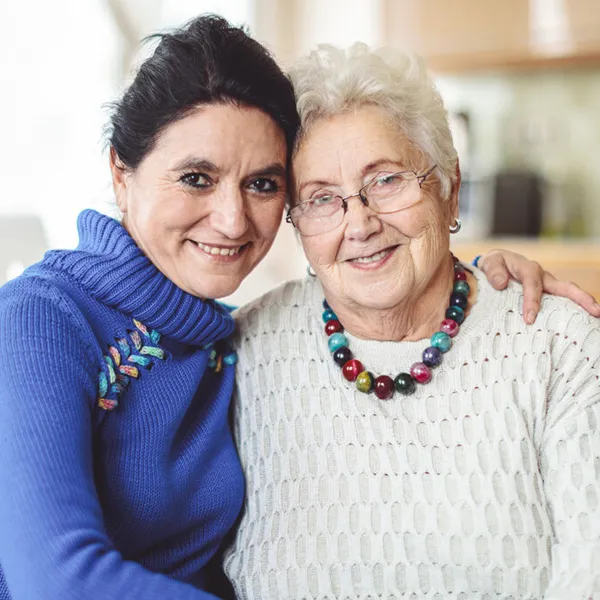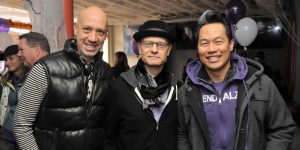
Your Gift Can Make 2x the Impact
Your Gift Can Make 2x the Impact
A gift can go twice as far during our February $100,000 2x Match. Your contribution by Feb. 27 will fuel Alzheimer’s research and help provide essential care and support.
Donate NowFinding Joy in the Face of Alzheimer’s: Richard Lui Talks Family & Long-Distance Caregiving
Tell us about your father Stephen’s Alzheimer’s diagnosis and how it came about.
It began with a diagnosis of dementia. The interesting part is my Dad never had a great memory – it was something we joked about. However, what started to happen was much more extreme.
Dad is one of 13 children in his family, and at Christmas, his youngest sister Fannie pulled me aside and said, “I’m concerned, Steve is forgetting our names.” He agreed he should get tested. This was about five years ago, and it resulted in a diagnosis of early signs of dementia. It wasn’t until about a year and a half after that that he was diagnosed with Alzheimer’s.
I’ve always traveled back to San Francisco from New York for family gatherings. During these visits, I was able to see moments in time — snapshots of my Dad, if you will — and I began to notice the differences in him. It was probably more nuanced for my mother, who lives with him, but I saw it, and now make the 5,000-mile round trip to see him once a week most months.
As a caregiver, how do you make this long-distance, long-term travel work with your schedule as an anchor and reporter?
The practice of consistently going back and forth helps me gather the information I need in a short amount of time. I try to stay with my parents when I come back so I can observe the nuances and changes…how it’s difficult for Dad to brush his teeth or walk down the block to get a haircut. Sometimes it’s hard to put on a strong face, but I do what I can to help my Mom, who is Dad’s primary caregiver.
From a professional standpoint, I am so thankful my supervisor understands the situation I am going through. When we sat down to talk about changing my work schedule, I found out she was also a long-distance caregiver who traveled to take care of her mother. She knew I had to start thinking about options immediately. Like a good journalist would do, she brainstormed options, and six months later our strategy was in place. My boss has been absolutely supportive of my need to go back west, having four to five days off and working two and a half days a week. That is very uncommon for very practical reasons of the way journalism works but NBCUniversal has been nothing short of amazing.
Your mother was born in China, and your father in San Francisco’s Chinatown. Have there been difficulties or cultural barriers in finding a support system or talking about the disease?
We are a multigenerational Asian American family, and each of us assimilates differently, just as any American family does in their community, city and social circles. When it comes to the way we handle my father’s diagnosis, each brings individual strengths. More broadly, Asian American and Pacific Islander (AAPI) families like ours take on responsibility of caregiving without thinking twice – an unwritten and sometimes unspoken practice that family is number one. But interestingly, despite this core family strength, few talk about it, nor share best practices openly. That said, my Dad doesn’t fit the stereotype. He was always open to whatever had to be done when he was sick and the same is true with his Alzheimer's.
One decision we made as a family was my Mom and Dad's living situation. Instead of moving because of my childhood home’s dangerous stairs, we decided to remodel their house so my Dad wouldn’t be shocked by a strange living situation which could cause more loss of memory. Instead, we created a stairless ranch level apartment in their tall “Full House” type San Francisco home we all grew up in that would help Mom and Dad's long-term living needs.
Interestingly, these are not topics we would typically talk about…long-term care, planning ahead…but because my father is so open, we were able to talk about it bluntly.
 How has your profession helped you handle your father’s Alzheimer’s?
How has your profession helped you handle your father’s Alzheimer’s?
Taking a plane is second nature to me; it’s like walking out the front door. That is why, despite having the most demanding travel schedule of my siblings, going back once a week to help my parents is not a big deal. And as a journalist, I learned years back that in order to tell good stories I had to emotionally access parts of who I am that I wouldn’t have had to otherwise if I was not a journalist. I feel comfortable asking difficult questions about care facilities, financial planning and other sensitive topics. I don’t want to do it, but we need to.
How did growing up with a close family help you face the challenge of being a caregiver?
We’ve always been a tight-knit extended family. Twice a year, my father’s side of the family would go to the cemetery and burn fake money and leave food for my grandfather, along with his favorites – whiskey and cigars. At Christmas, we would have 90 people together – cousins, aunties and uncles all celebrating the holiday. From road trips à la the “Vacation” movies where we piled into the station wagon to see my Mom’s family in L.A., to gathering for Ching Ming, it was never explicitly said “you have to take care of your family” – it was simply understood. We were close, and we will always be close. It’s just how we are. Caregiving is an extension of that.
What are the tough moments you’ve faced since your father’s diagnosis?
There have been many emotional moments. Most recently my father has lost the ability to shave, and I helped shave him for the first time. He laughed and smiled and thanked me as I cleared his whiskers. As a young man, my father was the one who taught me how to shave my chin. So this latest change was symbolic. And it was saddening. But it was my honor, too. I want to be the one who shaves him every day – but I can’t.
What moments of joy have you found since your father’s diagnosis?
I find moments of joy every time I go home! My Dad is a joyous person, which is much different from his personality before the diagnosis. He was a pastor and couldn’t support the family on his salary, so he became a social worker to have a steady income, but that didn’t pay much either and he wasn’t built emotionally for social work’s noble but trying tasks. He cared too much and was often stressed.
As a social worker, he was forward with people and told them what they had to be prepared for. In a way, he was equipping himself to be the happy embracive person he is today. And there’s the silver lining. He accepts his diagnosis for what it is.
For my own part, I’ve had to accept Dad’s Alzheimer’s diagnosis spiritually and emotionally. There was a time when I would describe being with him like watching my father die in front of me. Now I see him being born again in front of me. Life is a stack of pancakes, and Alzheimer’s takes the top pancakes little by little until you’re left with none. But through this process, my father has shown me another side. He hugs me and kisses me and tells me that he loves me over and over again. This is the person he always was who I’m only now getting to know.
Your mom is your father’s primary caregiver. What has her experience been like, and what have you drawn from her strength?
Mom talks to one of her good friends whose husband also has Alzheimer’s. She also talks to some of her other close church friends who are also caregivers every couple of weeks. She has a support system but despite that, I know this road hasn’t been easy for her. In moments when she’s alone with my Dad and I am in the other room, I can hear the frustration of a person who had been steely, personable, forthright and honest her entire life. She comes from a golden generation of exceptional values, but I can sometimes see the crack in her armor.
I listen to and look at the other women (who I call aunts) that my Mom gets support from. The commitment they’ve all made is exceptional, without a squeak or a squawk. I wish I could draw just a little bit of that attitude and energy into my life and do something to the degree they do—it’s amazing.
When I am at home in San Francisco, I sometimes hear Mom speak to Dad in certain ways and I tell her that he won’t understand. What she has said is too much; it’s too complex. “No, no no….if I say it to him, he will listen,” she says with her endless amount of hope. And sure enough — sometimes he does. She doesn’t give up. She is a hidden hero. All caregivers are.

About Richard Lui: Richard Lui has had an illustrious career that has included roles in marketing, strategy and technology. Today Richard is a journalist and news anchor for MSNBC and NBC News and is known for his humanitarian charity work. He served as emcee for the 2016 New York City Walk to End Alzheimer's.
Bottom photo: Richard Verdi, David Hyde Pierce & Richard Lui at the 2016 New York City Walk.

The first survivor of Alzheimer's is out there, but we won't get there without you.
Donate Now
Learn how Alzheimer’s disease affects the brain.
Take the Brain Tour
